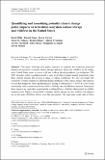Quantifying and monetizing potential climate change policy impacts on terrestrial ecosystem carbon storage and wildfires in the United States
Author(s)
Mills, David; Jones, Russell; Carney, Karen; St. Juliana, Alexis; Ready, Richard; Crimmins, Allison; Martinich, Jeremy; Shouse, Kate; DeAngelo, Benjamin; Monier, Erwan; ... Show more Show less
Download10584_2014_Article_1118.pdf (1.985Mb)
PUBLISHER_CC
Publisher with Creative Commons License
Creative Commons Attribution
Terms of use
Metadata
Show full item recordAbstract
This paper develops and applies methods to quantify and monetize projected impacts on terrestrial ecosystem carbon storage and areas burned by wildfires in the contiguous United States under scenarios with and without global greenhouse gas mitigation. The MC1 dynamic global vegetation model is used to develop physical impact projections using three climate models that project a range of future conditions. We also investigate the sensitivity of future climates to different initial conditions of the climate model. Our analysis reveals that mitigation, where global radiative forcing is stabilized at 3.7 W/m2 in 2100, would consistently reduce areas burned from 2001 to 2100 by tens of millions of hectares. Monetized, these impacts are equivalent to potentially avoiding billions of dollars (discounted) in wildfire response costs. Impacts to terrestrial ecosystem carbon storage are less uniform, but changes are on the order of billions of tons over this time period. The equivalent social value of these changes in carbon storage ranges from hundreds of billions to trillions of dollars (discounted). The magnitude of these results highlights their importance when evaluating climate policy options. However, our results also show national outcomes are driven by a few regions and results are not uniform across regions, time periods, or models. Differences in the results based on the modeling approach and across initializing conditions also raise important questions about how variability in projected climates is accounted for, especially when considering impacts where extreme or threshold conditions are important.
Date issued
2014-04Department
Massachusetts Institute of Technology. Center for Global Change ScienceJournal
Climatic Change
Publisher
Springer Netherlands
Citation
Mills, David, Russell Jones, Karen Carney, Alexis St. Juliana, Richard Ready, Allison Crimmins, Jeremy Martinich, Kate Shouse, Benjamin DeAngelo, and Erwan Monier. “Quantifying and Monetizing Potential Climate Change Policy Impacts on Terrestrial Ecosystem Carbon Storage and Wildfires in the United States.” Climatic Change 131, no. 1 (April 24, 2014): 163–178.
Version: Final published version
ISSN
0165-0009
1573-1480